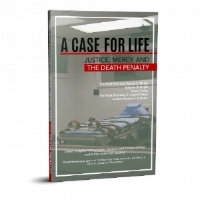
By Don Plummer
Written from their personal experiences with both the victims and perpetrators of murder, the authors of A Case for Life: Justice, Mercy and the Death Penalty share intimate details of the experiences that led them to conclude executions do not provide a safer society nor closure for the surviving victims of terrible crimes.
Episcopal Bishop Robert C. Wright says for much of his life he rarely thought about the death penalty. “I heard the announcements of executions on the news or read them in the paper, but I was indifferent, or, whatever the word for indifferent to indifference is.” Wright regularly visited prisoners over the decades of his ministry, but says it took becoming bishop of a diocese that includes the town where people are executed in his state to change his perspective. “Jackson is a city in The Episcopal Diocese of Atlanta. Jackson is where people I know, love, and serve alongside live. Jackson – where we kill people in Georgia – is one of the places I promised to be the chief pastor!” As bishop, Wright has become an outspoken opponent of executions – attending vigils prior to each execution, conducting communion services on death row and voicing his opposition to elected officials. “‘The thing is, Jesus taught compassion for victim and perpetrator. Opposition to the death penalty does not mean lack of compassion for the pain and suffering of the victims or their families.”

Photo was taken at the Death Penalty Discussion and Book Signing event at Holy Innocents’ on 2/15/18
Attorney Stephen Bright shares a perspective of the death penalty gained over three decades as an attorney. In addition to the hundreds of cases he has defended on appeal, Bright has three times taken death penalty appeals to the United States Supreme Court. In each case, the Supreme Court reversed the defendants’ convictions and death sentences. Rather than being reserved for the worst cases, Bright contends the death penalty is most often visited upon those with the worst life conditions. “Virtually all of the people selected for execution are poor. (A)bout half – are members of racial minorities, and the overwhelming majority of them are sentenced to death for crimes against white victims. Some are innocent. Many have significant intellectual disabilities or severe mental illnesses.” Bright shares chilling examples of the death penalty’s fatal flaws. “Poor legal representation contributes to innocent people being condemned to death. Since 1976, 156 people sentenced to death have later been exonerated; some were on death rows for over 30 years before being released. Some people have been executed who are now known to be innocent.”
Attorney Susan Casey recounts her emotionally harrowing experience representing Kelly Gissendaner, the only woman executed in Georgia since the 1940s. “Initially, Kelly could not face what she had done. During the years that followed, however, she changed. With the support and encouragement of a devoted pastoral counselor and chaplain, Kelly confronted the terrible truth, reckoning with and accepting responsibility for her role in Doug’s murder.” Over her years in prison Gissendaner became a valued counselor and role-model for other women prisoners. Her developing faith also inspired her jailers and fellow inmates. But Casey says none of that mattered when it came time for Georgia’s clemency board to decide her fate. Casey recalls being present just after midnight on September 30, 2015 when Gissendaner was executed. She watched through her tears holding her hand over her heart as her client accepted full responsibility for her involvement in her husband Doug’s murder and died singing “Amazing Grace” as she was given the lethal injection.
Episcopal Bishop C. Andrew Doyle of the Diocese of Texas tells the story of the journey taken by members of a parish after their beloved pastor and his wife and son were murdered. Doyle recalls his horror upon learning that Episcopal Priest Israel Ahimbisibwe; his wife, Dorcus; and their five-year-old son, Israel Jr., had been murdered. A horror that was compounded when he learned that Isaac, one of the couple’s two other sons, had killed them. But, instead of seeking vengeance, those who knew and loved the Ahimbisibwes best reflected their pastor’s commitment to peace and reconciliation developed during his work amid the violence, brokenness, divisions, and massacres of his homeland Uganda’s civil war. “Isaac escaped execution and received life in prison because of the efforts of the many parishioners and friends who took on Isaac’s case. Their efforts ensured that Isaac’s name was not added to the 537 names of individuals executed by the state of Texas since 1976.”

Photo was taken at the Death Penalty Discussion and Book Signing event at Holy Innocents’ on 2/15/18
Retired Georgia Supreme Court Chief Justice Norman Fletcher journey to rejecting “the machinery of death” slowly grew after more than two decades of frequently voting against death penalty appeals. “My decision is a result of my long journey dealing and living with the flawed death penalty process for 25 years. And it came about after much thought and prayer.”
Methodically building his case against the death penalty, Fletcher ticks off misunderstandings about executing murders: it doesn’t deter crime, it is outrageously expensive, it is not fairly and consistently applied. “Most importantly to me and to many others—including the late U.S. Supreme Court Justice Thurgood Marshall—the death penalty is morally indefensible.”
The book also includes a resources section listing death penalty organizations, faith community statements, and further readings on the death penalty readers can use in arriving at their own conclusions about the death penalty.

A Case for Life: Justice, Mercy and the Death Penalty
By Stephen Bright, Susan Casey, C Andrew Doyle, Norman Fletcher and Robert C. Wright,
Atlanta, Episcopal Diocese of Atlanta Press, 2018
ISBN: 978-0-9983131-4-6
Softcover, 5” x 8”, 76 pages, List Price $11.95
Purchase on-line or in-store at the Cathedral Bookstore (directions).
